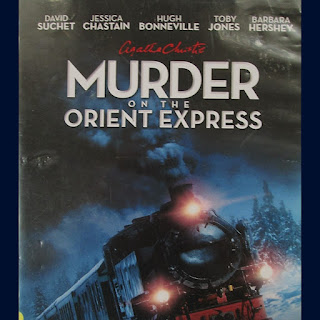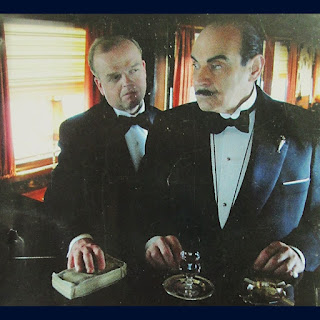Murder on the Orient Express
The David Suchet version of Murder on the Orient Express definitely veers away from the book. The core story
is there, but so much else is different.
 |
| Murder on the Orient Express |
Hercule Poirot’s beliefs are challenged
Hercule Poirot’s (David Suchet)
summation does not go according to plan. The guilty party, a soldier, shoots
himself before Poirot can have him arrested. This suicide rattles Poirot, but
he remains certain the soldier would not have felt he must go to such desperate
measures had he not lied in the first place. He also insists that no matter the
reason for the crime, justice must be done.
After this, Poirot witnesses a
woman being stoned to death. The woman was carrying the child of someone who
was not her husband, leading to this punishment. Of course, we do not see any
punishment towards the man.
A couple witness the stoning too.
The woman, Mary Debenham (Jessica Chastain), is particularly distressed, but
there is nothing any of them can do.
This all happens before Poirot
even knows he will be on the Orient Express. He hadn’t planned on being on the
train, but an urgent matter calls him back to England. After running into
railway director Bouc (Serge Hazanavicius), Poirot is guaranteed a berth on a
very packed train. Some of the other passengers are not happy about his
presence.
Mary Debenham is on the train too.
She tries to talk to Poirot about what they saw, but he dismisses her concerns.
He justifies the stoning by saying that what they saw was considered justice in
some countries, and that the woman broke the rules. Pretty much he’s implying
that based on the rules of where they were, the punishment fit the crime and
the woman was at fault. This does not go over well with Mary.
Poirot denies Ratchett what he wants
Also on the train is a very
unpleasant man named Ratchett (Toby Jones). He is a man used to getting what he
wants. What he wants now is Poirot.
For a while Ratchett has been
receiving threatening notes. He wants Poirot to protect him during their
journey. Poirot refuses. No amount of money will convince Poirot to work for
Ratchett.
 |
| Murder on the Orient Express Toby Jones, David Suchet |
Poirot’s investigation begins
During the night, Ratchett is
murdered. Poirot is asked to investigate. Obstetrician Dr. Constantine (Samuel West) helps him. Well, he helps him to a point. Dr. Constantine has the
tendency to come up with wild theories of the murder that Poirot does not
appreciate.
Bouc also helps, sort of. He is far
more concerned about the train’s reputation than anything else. He is also
pretty inept at keeping things in order. Actually, Bouc is pretty much inept at
everything. How he made his way up to director, I have no idea.
To help with his investigation, everyone
is assembled in one car and Poirot begins his interviews. The people he must
interview are:
Train conductor Pierre Michel
(Denis Ménochet)
Ratchett’s secretary, Hector
MacQueen (Brian J. Smith)
Ratchett’s valet, Edward
Masterman (Hugh Bonneville)
American Caroline Hubbard
(Barbara Hershey)
Missionary Greta Ohlsson (Marie-Josée
Croze)
Princess Natalia Dragomiroff
(Eileen Atkins)
Count and Countess Andrenyi
(Stanley Weber and Elena Satine)
The man who witnessed the stoning
with Mary, John Arbuthnot (David Morrissey)
Italian American Antonio
Foscarelli (Joseph Mawle)
Mary Debenham
The princess’s maid, Hildegarde
Schmidt (Susanne Lothar)
The group does not take well to
being questioned. They also have even less sympathy for Ratchett’s murder when
they find out he is really a kidnapper and murderer named Cassetti.
When the culprit is revealed,
there is a lot of talk about what should be done. The passengers believe the
murder was justice because of what Ratchett got away with in life. Poirot
disagrees. He does not see murder as justice. That is what the courts are for.
Except in Ratchett’s case the courts failed. Faced with this reality, Poirot
must figure out if he is going to turn in the culprit or not.
A movie unlike the book
As I said, this version of Murder
on the Orient Express is very different from the book. There is a lot of
discussion about religion, justice, and the psychological impact of events.
Also, Poirot seems really weary. It’s as though he has had enough of the world
and has lived too long. On top of this, the answer to who killed Ratchett is
not exact to the book. Mostly accurate, but not fully.
Something else I noticed is the
passion Poirot has for his beliefs and what he does for a living. If he is
going to investigate a case, he is going to do it right, no matter the
circumstances. I did not get this much passion from the book or the Albert
Finney film version.
This Poirot also has a passion
about what other people do. He definitely has a view on how life should be
lived. When others do not live up to those views, he becomes frustrated to the
point I worry about his health. It is not good for anyone to get as angry as he
does. It can do the body a lot of harm. This might be why Poirot is slowing as
he is.
I have one more note about David
Suchet’s Murder on the Orient Express. The snowstorm and lack of heat on
the train provided a lot of drama to this film. Be ready to feel cold.
The final film adaptation of Murder
on the Orient Express I will watch is Kenneth Branagh’s. I hope I can get
beyond the mustache and follow the story.
Murder on the Orient Express
by Agatha Christie


Comments